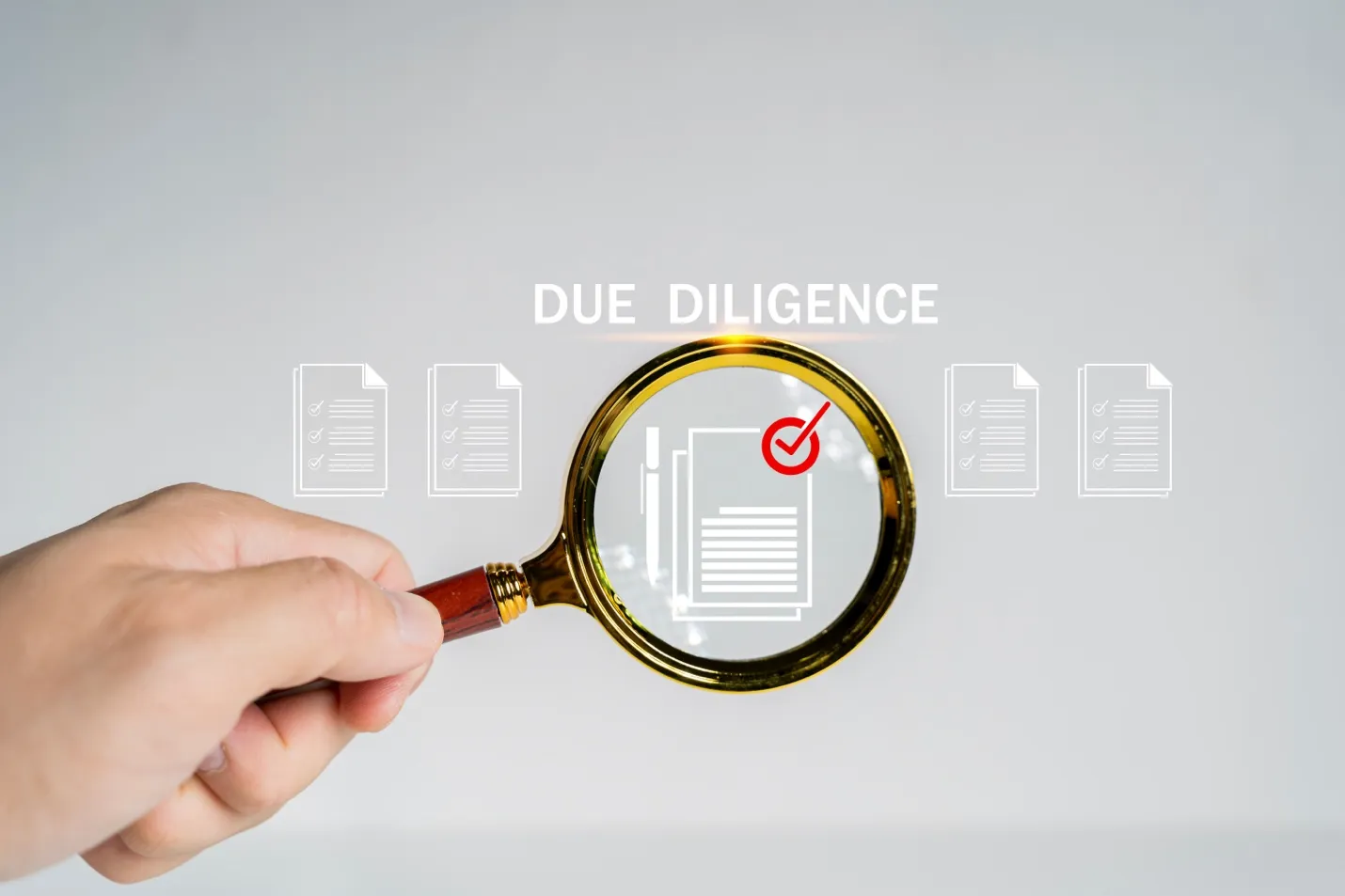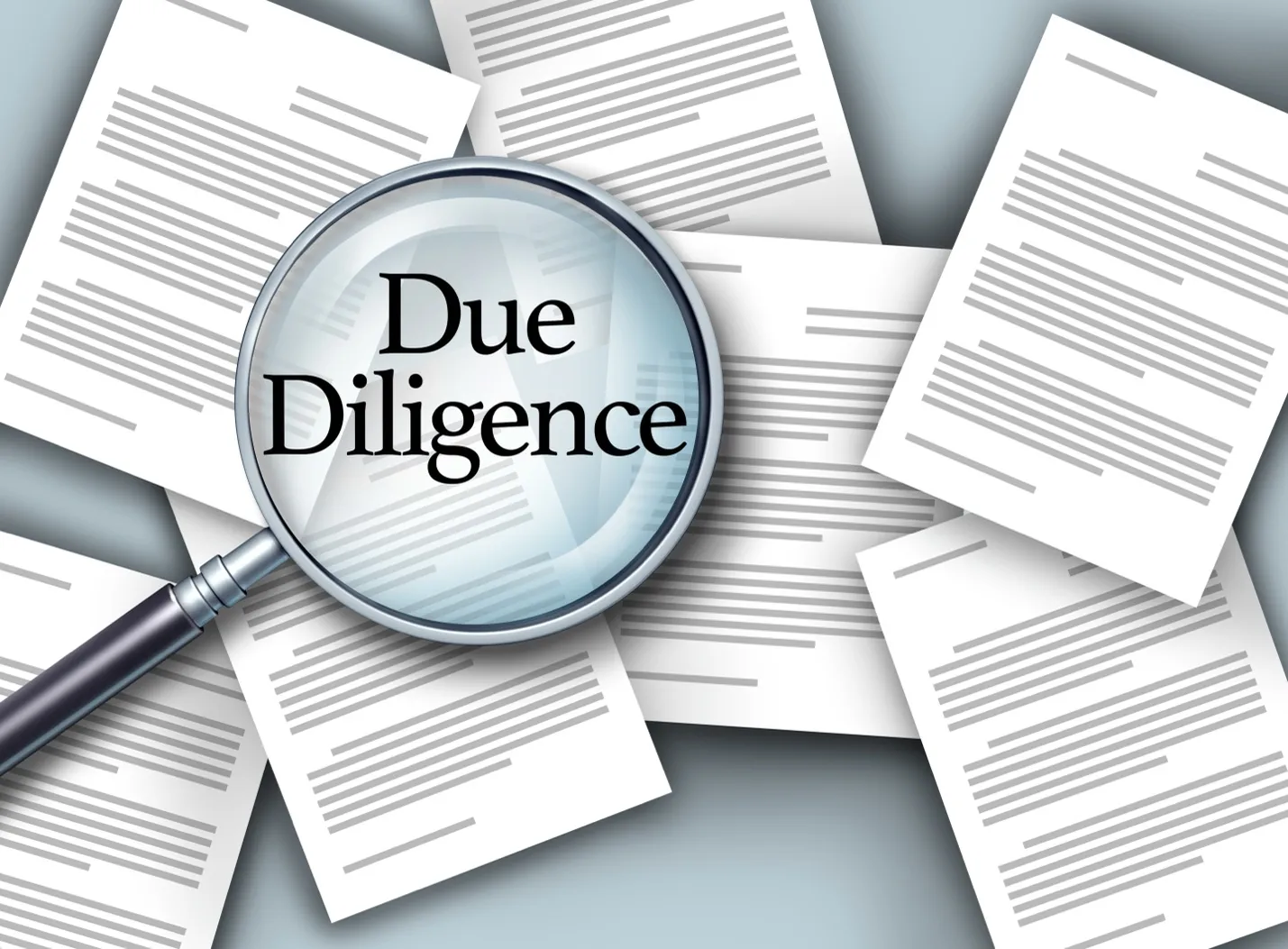How to Conduct Due Diligence When Buying a Business?
Before you commit to buying a business, be aware of its complexity and the many factors involved. Instead of rushing in with an offer, it is strongly recommended that you spend some time doing your due diligence on the business.
Due diligence will allow you to fully understand the legal, financial, tax and operational aspects of the business. By taking this precaution, you can make informed decisions and avoid unpleasant surprises.
Due diligence is an essential step in minimizing potential risks and guaranteeing the success of your acquisition!

| In this article SME Lawyers tells you everything you need to know about due diligence before buying a business! |
|---|
What is Due Diligence?
Due diligence is a critical process for evaluating all aspects of a business before acquisition. It verifies the seller’s claims, identifies risks, and uncovers opportunities, ensuring buyers protect their investment and understand the business’s true condition.
This thorough review examines legal, financial, tax, operational, and commercial factors, offering buyers and their advisors the insights needed for informed decision-making and a successful transaction.
Why is Due Diligence Essential When Acquiring a Business?
Due diligence is essential for minimizing the risks associated with buying a business, providing a thorough process that offers invaluable insights. This detailed evaluation allows buyers to:
| Key Benefits of Due Dilligence | Explanation |
|---|---|
| Make informed decisions | A comprehensive analysis of the business enables the buyer to gain a full understanding of its operations, financial health, and market position. This transparency reduces the chances of unexpected surprises post-acquisition, helping the buyer to confidently move forward. |
| Identify challenges and set expectations | By thoroughly examining areas like legal, financial, and operational matters, due diligence helps buyers pinpoint potential problems, such as unresolved legal issues or financial instability. This foresight allows the buyer to adjust their acquisition plans and set realistic expectations for the future. |
| Negotiate the purchase price | During the due diligence process, any hidden concerns in critical areas like legal, financial, tax, or operational risks can be uncovered. Identifying these issues provides the buyer with the leverage needed to renegotiate the purchase price, ensuring they are not overpaying for the business or taking on undue risk. |
| Discover growth opportunities | Due diligence doesn’t just uncover risks, it also highlights potential growth areas within the business. By identifying inefficiencies or untapped markets, it provides the buyer with the insight needed to enhance operations, increase profitability, and position the business for long-term success. |
| Ensure investment stability | A comprehensive due diligence review offers a complete and accurate picture of the business, including its financial health, liabilities, and market standing. With this information, the buyer can ensure that their investment is sound, offering stability and profitability post-acquisition. |
Additionally, due diligence plays a crucial role in helping buyers make informed decisions by thoroughly assessing the true value of a business, ensuring that it aligns with both strategic and financial objectives. It helps uncover hidden liabilities and risks, which could negatively impact future operations and profitability.

By identifying these potential issues beforehand, due diligence allows buyers to avoid costly mistakes that could otherwise result in unforeseen expenses after the purchase. Moreover, it strengthens a buyer’s negotiation position by providing leverage to secure better terms based on informed findings.
Lastly, due diligence prepares buyers for a smoother integration process, ensuring that post-acquisition operations and management are handled efficiently, minimizing disruption and maximizing the value of the purchase.
What Are the Key Areas to Focus on During Due Diligence?
When considering the acquisition of a business, conducting thorough due diligence is crucial. This comprehensive process involves a detailed investigation into various facets of the business to verify its value and uncover any hidden issues that could impact the acquisition’s success.
Below are the key areas to focus on during due diligence, each of which plays a critical role in assessing the overall health and viability of the business:
Financial Due Diligence
One of the most fundamental aspects of due diligence is the financial review, as it offers a clear picture of the business’s financial health and helps to identify any potential red flags. The goal is to verify the accuracy and consistency of the financial records and ensure the business’s financial position is solid. Key areas of focus include:
- Profit and Loss Statements: A deep dive into the company’s profit and loss statements over the past three to five years is essential. These statements highlight the business’s revenue streams, profit margins, and expense structures.
Analyzing these elements will give you insight into the company’s financial performance, profitability, and areas where costs may be inflated or revenue may be overstated.
- Balance Sheets: The balance sheet provides a snapshot of the business’s financial position, detailing assets, liabilities, and equity.
By reviewing these figures, you can access the company’s ability to meet its financial obligations and understand the level of debt or equity the business holds. Checking for any discrepancies or inconsistencies in the balance sheet is crucial to ensure that the reported financial position is accurate.
- Cash Flow Statements: The cash flow statement provides a detailed picture of the company’s liquidity, showing how cash flows in and out of the business. This is critical for understanding whether the business can sustain its operations without relying on external financing.

You should assess the business’s ability to generate positive cash flow from its core operations, as this will be a key factor in determining its long-term financial stability.
- Tax Returns: Review the business’s tax returns to ensure that they are accurate and up-to-date. Any discrepancies in tax filings can lead to unforeseen tax liabilities or legal issues down the line. Verifying that tax filings are in order minimizes the risk of inheriting any potential tax-related problems from the business.
Legal Due Diligence
Legal due diligence is a crucial step in uncovering any potential legal risks that could negatively impact the acquisition. This process involves reviewing the business’s legal status, contracts, and any past or pending legal disputes. Key elements of legal due diligence include:
| Key elements | Explanation |
|---|---|
| Corporate documents | Start by reviewing the company’s foundational legal documents, including its articles of incorporation, corporate bylaws, shareholder agreements, and ownership records. These documents provide clarity on the legitimacy of the business’s structure and ownership, ensuring that the company is legally registered and in good standing. |
| Contracts and agreements | Assess all active contracts and agreements, including those with suppliers, customers, and partners. You need to ensure that these contracts will remain valid and enforceable after the acquisition. Pay special attention to clauses that may trigger termination or renegotiation upon a change in ownership. |
| Pending or past litigation | Investigate whether the business is currently involved in any ongoing legal disputes or has a history of significant legal issues. Lawsuits or regulatory actions can create liabilities for the buyer and might negatively affect the reputation or operations of the business. Understanding the scope and potential impact of any legal disputes is essential. |
| Intellectual property | Verify the ownership and protection of any intellectual property, including trademarks, patents, copyrights, and trade secrets. Ensuring that intellectual property rights are properly assigned and protected will help avoid potential disputes in the future and safeguard the value of the business’s intangible assets. |
Compliance and Regulatory Matters
Ensuring a business complies with relevant industry regulations and standards is a crucial aspect of the due diligence process. Failing to do so can lead to significant legal and financial consequences after the acquisition. Compliance and regulatory checks are essential in identifying potential risks that could affect the business’s operations and long-term viability.
- Health and Safety Regulations:
Regardless of the industry, businesses must adhere to the city, provincial, and federal health and safety regulations. These laws are designed to protect employees, customers, and anyone interacting with the business. Buyers should review the company’s compliance record with occupational health and safety laws.
This may involve verifying certifications, inspecting workplace safety records, and ensuring that the business follows safety protocols to minimize accidents and potential legal claims. Non-compliance could lead to fines, lawsuits, and a damaged reputation.
- Environmental Regulations:
Environmental compliance is especially important for businesses in industries with a significant impact on natural resources, such as manufacturing, chemicals, and waste management. Buyers should investigate whether the business complies with environmental laws and regulations governing areas such as:
- Waste disposal
- Pollution
- Energy usage
- Emissions
Regulatory bodies often impose stringent guidelines to protect the environment, and failure to comply can result in hefty fines, costly cleanup procedures, or even legal action. Additionally, non-compliance could lead to environmental damage, which can significantly affect the business’s long-term profitability and reputation.
- Industry-Specific Legal Requirements:
Many industries have their own set of regulatory requirements that must be followed to ensure continued operation. For instance, businesses in the healthcare industry must comply with regulations regarding patient privacy, while those in the financial sector need to adhere to strict reporting and auditing standards.

Buyers should verify that the business meets all industry-specific laws and regulations, including those related to certifications, and professional standards.
- Licensing and Permits:
One of the most important aspects of compliance is ensuring that the business has obtained all necessary licenses and permits required to operate legally. This involves verifying that the company possesses all necessary city, provincial, and federal licenses required for its specific industry.
Buyers should also check that any licenses or permits are current and do not have any outstanding renewal issues. In some cases, transferring these licenses to the new owner may require specific processes or approval. If a business operates without the necessary permits, it could be subject to fines, penalties, or even forced closure.
- Quality Control and Operational Mandates:
Many industries, especially those involved in manufacturing, food production, and pharmaceuticals, are subject to rigorous quality control standards. Buyers should ensure the business adheres to these standards to prevent future operational disruptions.
This might include confirming that the business follows proper production procedures, maintains product quality, and meets safety and regulatory standards for products and services. If the business fails to meet industry quality standards, it could face recalls, legal action, or a loss of market trust.
In summary, ensuring compliance with all relevant laws and regulations is an essential part of due diligence when acquiring a business. Compliance checks provide the buyer with peace of mind that the business operates within the boundaries of the law and is positioned for sustainable success without the risk of legal setbacks.
Operational Due Diligence
A business’s day-to-day operations play a significant role in its overall success and its ability to integrate smoothly after an acquisition. Operational due diligence aims to evaluate the current processes and systems to ensure they are efficient and scalable. Key areas of operational due diligence include:
- Production and Service Delivery: Review the efficiency and scalability of the company’s production or service delivery processes. Assess whether these processes are capable of meeting future demand and if there are any operational bottlenecks that need to be addressed. Identifying areas for improvement can help optimize operations after the acquisition.
- Supply Chain: Evaluate the reliability and stability of the company’s supply chain. This includes reviewing supplier relationships, contract terms, and the potential for disruptions that could impact the business’s ability to maintain operations. A solid and resilient supply chain is essential for ensuring that the business can operate smoothly after the acquisition.
- Technology and Systems: Examine the company’s IT infrastructure, software licenses, and proprietary technologies. Understanding the condition of these systems is critical, as outdated or incompatible technologies could pose integration challenges post-acquisition. Additionally, assessing the security and scalability of IT systems is important for supporting future growth.

- Facilities and Equipment: Inspect the company’s physical assets, including facilities, machinery, and equipment, to determine their condition and value. Outdated or poorly maintained assets may require significant investment after the acquisition. Ensuring that assets are in good working order will help avoid unforeseen capital expenditures.
Understanding how the business operates on a day-to-day basis is essential for determining whether the acquisition will be sustainable. Buyers should conduct site visits to inspect the condition of physical facilities and ensure they are in good standing and suitable for continued business operations.
Market and Competitive Due Diligence
Understanding the broader market dynamics and competitive landscape is essential for assessing the future prospects of the business. Market and competitive due diligence focus on identifying opportunities and threats within the industry. Key areas to evaluate include:
- Industry Trends:
Analyze the current state of the industry and its future outlook. Understanding key industry trends, such as technological advancements, regulatory changes, and market shifts, will help you determine whether the business is well positioned for future growth or at risk of obsolescence.
This also includes assessing the potential impact of emerging competitors or disruptive innovations.
- Customer Base:
Assess the diversity, loyalty, and size of the company’s customer base. A broad and loyal customer base provides stability and growth potential for the business. Conversely, a concentrated customer base or declining demand from key customers could be a red flag, signalling potential risks to future revenue streams.
- Competitors:
Identify the key competitors in the market and assess their market share, strategies, and strengths. Understanding how the business compares to its competitors will help you gauge its competitive advantage and determine if any competitive threats could undermine its position in the market.
Human Resources and Organizational Due Diligence
Employees are a critical component of any business and understanding the human resources (HR) landscape is crucial for ensuring the smooth transition of operations after the acquisition. Human resources due diligence involves reviewing employee-related matters to identify potential risks and opportunities. Key areas to focus on include:
| Key areas | Explanation |
|---|---|
| Staff structure | Analyze the company’s organizational chart to understand the key roles and personnel within the business. Identify any key employees whose departure could significantly affect the business’s operations. Understanding the depth of the management team and staff capabilities will help determine whether the business has the right human resources in place for future growth. |
| Employee contracts | Review all employee contracts, including employment agreements, collective labour agreement, non-compete clauses, and benefit plans. Ensure that these contracts are compliant with labour laws and that any potential liabilities, such as severance obligations, are identified. |
| Workplace culture | Assess the company’s workplace culture and employee morale. A positive work environment can enhance productivity and retention, while a toxic culture could lead to high turnover and low employee engagement.Understanding the company’s culture is important for integrating the business smoothly after the acquisition and ensuring ongoing success. |
By focusing on these critical areas during due diligence, buyers can mitigate risks, uncover hidden issues, and make informed decisions about whether to proceed with the acquisition. Each of these steps provides valuable insights that will help ensure the success of the acquisition and contribute to long-term profitability and business growth.
SME Lawyers Help You Find a Business Lawyer for Your Due Diligence!
If you are about to buy a business, it is essential to ensure that your due diligence process is thorough and addresses all the necessary areas. In this case, it is highly advisable to consult with a lawyer who specializes in business law. A business lawyer possesses in-depth knowledge of the legal complexities involved in due diligence.
They will identify the key areas that require attention and guide you through each step of the process. By managing the legal aspects of due diligence, they ensure that no critical detail is overlooked. Additionally, if specialized expertise is needed in areas such as finance, taxation, or operations, they can connect you with trusted professionals to assist.
Ultimately, having a skilled business lawyer by your side provides invaluable peace of mind, empowering you to make informed and confident decisions throughout the acquisition process.

SME Lawyers provides a fast, simple, and cost-free solution to connect you with a business lawyer!
Just complete our request form with details about your situation, and we’ll quickly pair you with a lawyer in your locality. The best part? There are no obligations for you to proceed!
